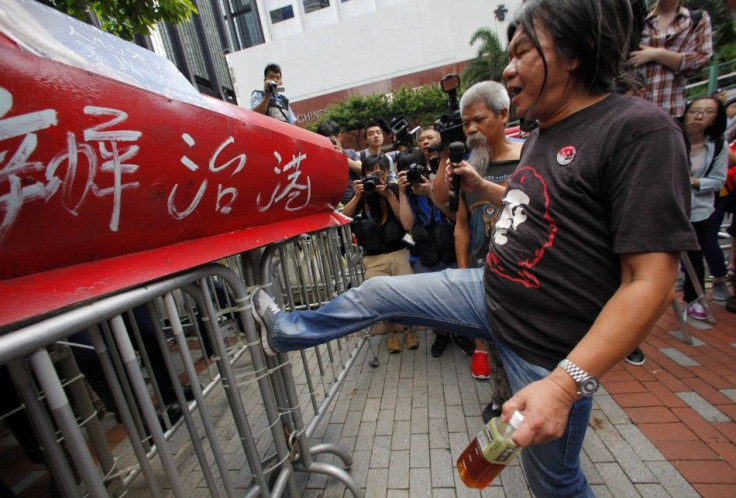The Last 'Occupy' Encampment? Hong Kong's Anti-Capitalist Demonstrators Due For Eviction

Hong Kong's wing of the Occupy movement, known as Occupy Central, is likely to be evicted from its headquarters following a Monday court decision.
The group, which is related to the Occupy Wall Street movements that swept New York and other cities last year, will now have to find a new hub in Hong Kong.
The demonstrators had gathered in the shadow of the HSBC Bank headquarters. The banking and financial services firm is housed in an iconic tower in Hong Kong, and Occupy Central had set up camp next to a courtyard and public walkway.
HSBC had asked the courts for the right to evict the demonstrators on July 16. Now, after less than a month of judicial consideration, they've won their case. The demonstrators have two weeks to clear the premises.
"We welcome the decision of the court and look to the occupiers to follow the terms of the court order," said HSBC spokesman Gareth Hewett to Agence France-Presse.
Occupy Central's goal was to turn the spot into a productive public meeting place, said a recent statement on the group's website.
"Prior to the occupation, bodies would course through this passageway, a continuous surge of bodies in transit to their office cubicles, to their automobiles, to their claustrophobic apartments," said the statement.
"Now, we have established a point of convergence that attracts all of the explosive energies that resist the unstoppable flow of alienated life, so that a collective form of thinking and acting can crystallize."
The Hong Kong occupation movement did not rival the New York protests in scale or influence. After all, Asian economies did not feel the recession as strongly as did the United States -- as a result, there were fewer jobless youths available to participate in demonstrations.
But Hong Kong, like the U.S., does have a poor record for wealth equality. It has gotten worse in recent years, reports Bloomberg -- the city now has the biggest wealth gap in Asia. In 2011, the average monthly income of the poorest 10 percent of Hong Kong's population was US$280. For the richest 10 percent, it was US$17,724. While the middle class gets squeezed, the poor have gotten poorer and the rich have gotten richer.
Maybe that's why Hong Kong's HSBC encampment has won in terms of longevity -- at least compared to similar movements around the world. Occupy Central began shortly after New York City activists set up their own tents just blocks away from Wall Street, in Zuccotti Park. After that gathering was cleared by security forces in November, Occupy Wall Street's prominence declined considerably. Many movements around the world also petered out in similar fashion.
But in Hong Kong, the HSBC camp held on.
Still, their numbers have been drastically reduced since the movement began 10 months ago. At its height, the HSBC encampment held about 500 protesters, according to the BBC. But in the days leading up to the court ruling, only about a dozen tents dotted the grounds of the HSBC passageway. On weekends, the long-term campers were typically joined by hundreds of workers who wanted to support the movement on their days off.
Now that they are set to be evicted, some occupiers told journalists that they expected to find a new encampment location soon.
© Copyright IBTimes 2025. All rights reserved.





















